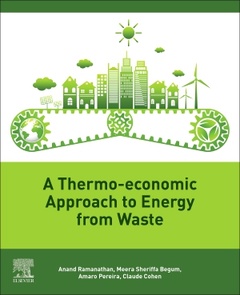Description
A Thermo-Economic Approach to Energy from Waste
Authors: Ramanathan Anand, Begum Meera Sheriffa, Pereira Amaro Olimpio, Cohen Claude
Language: English
Subject for A Thermo-Economic Approach to Energy from Waste:
Keywords
?Aspen plus; Biodiesel; Biogas; Biomass; Climate change; Energy recovery; Environmental impact; Fischer–Tropsch reactor; Gasification; Gasifier; Kinetic modeling; Kinetics; Life cycle assessment; Mechanism of pyrolysis; Novel technologies of BD production; Pretreatment; Pyrolysis; Renewable fuels; Syngas; TEA; Torrefaction; Transesterification; Upgradation techniques; Urban solid waste; Waste in favelas; Waste-to-energy
165.11 €
In Print (Delivery period: 14 days).
Add to cart220 p. · 19x23.3 cm · Paperback
Description
/li>Contents
/li>Biography
/li>Comment
/li>
A Thermo-Economic Approach to Energy From Waste provides readers with the tools to analyze the effectiveness of biomass waste conversion into value-added products and how thermochemical conversion methods can be commercialized with minimum environmental impact. The book provides a comprehensive overview of biomass conversion technologies through pyrolysis, including the types of reactors available, reactor mechanisms, and the upgradation of bio-oil.
Case studies are provided on waste disposal in selected favelas (slums) of Rio de Janeiro, including data on subnormal clusters and analyses of solid waste in the 37 slums of Catumbi. Step-by-step guidance is provided on how to use a life cycle assessment (LCA) approach to analyze the potential impact of various waste-to-energy conversion technologies, and a brief overview of the common applications of LCA in other geographical locations is presented, including United States, Europe, China, and Brazil. Finally, waste-to-value-added functional catalysts for the transesterification process in biodiesel production are discussed alongside various other novel technologies for biodiesel production, process simulation, and techno-economic analysis of biodiesel production.
Bringing together research and real-world case studies from an LCA perspective, the book provides an ideal reference for researchers and practitioners interested in waste-to-energy conversion, LCA, and the sustainable production of bioenergy.
1. Pyrolysis of waste Biomass: Towards sustainable development2. Biomass pyrolysis system based on Life cycle assessment and Aspen plus analysis and kinetic modelling3. Biomass gasification integrated with Fischer-Tropsch reactor: Techno-economic approach4. Energy recovery from biomass through gasification technology5. Life Cycle Assessment applied to Waste-to-Energy Technologies6. Waste disposal in Selected Favelas (slums) of Rio de Janeiro7. Waste to value added functional catalysts for transesterification process in biodiesel production
Dr.Meera Sheriffa Begum K.M, graduated from Anna University, Chennai. She has got industrial experience at “Chennai Petroleum Corporation Ltd (Formerly Madras Refineries Ltd) at R&D division as “MRL Research Fellow from 1991-95. She is currently professor at Department of Chemical Engineering. She has received many best paper awards in international conferences, granted two patents, several publications in renowned international journals. Co-authored three chemical Engineering text books published by PHI, India. She has contributed research, sponsored and consultancy projects towards Sustainable environment and energy funded by MHRD, DST and CSIR and SPARC. Undertaken research training at NUS, Singapore through TEQIP. She has executed Industrial consultancy projects for wastewater treatment in Trichy Distilleries, Dairy industry, Textile industry, and Tamilnadu Paper Ltd., using func
- Presents an overview of the technologies for the production of biofuels from waste via pyrolysis and gasification
- Provides a guide to the utilization of LCA to assess the economic and environmental impact of value-added products
- Describes real-world case studies on the implementation of LCA in waste-to-energy scenarios




